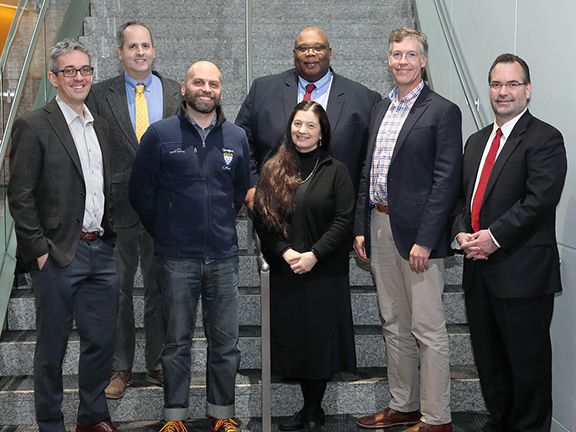Six New Members Appointed to National Advisory General Medical Sciences Council
03/04/2019
NIGMS Office of Communications and Public Liaison
301-496-7301
Six new members recently joined the Advisory Council of the National Institute of General Medical Sciences (NIGMS). The National Advisory General Medical Sciences Council (NAGMS), which meets three times a year, is composed of leaders in the biological, chemical and medical sciences, education, health care, and public affairs. Members serve four-year terms and perform the second level of peer review for grant applications assigned to NIGMS, part of the National Institutes of Health. Council members also offer advice and recommendations on policy and program development, program implementation, evaluation, and other matters of significance to the mission and goals of NIGMS.
"Our advisory council is an important conduit of information and advice from the scientific community and other stakeholders," said Jon R. Lorsch, Ph.D., director of NIGMS. "We rely on this group of wise people to help guide the Institute's decisions and relay new ideas and concerns from the community to the institute."
 NIGMS Director Dr. Jon R. Lorsch (second from l) welcomes the newest members of the NIGMS Council. Shown are (from l) Dr. John G. Younger, Dr. Enrique M. De La Cruz, Dr. Celeste Berg, Dr. Squire J. Booker, Dr. Peter J. Espenshade, and Dr. Darrin Akins. Credit: NIGMS.
NIGMS Director Dr. Jon R. Lorsch (second from l) welcomes the newest members of the NIGMS Council. Shown are (from l) Dr. John G. Younger, Dr. Enrique M. De La Cruz, Dr. Celeste Berg, Dr. Squire J. Booker, Dr. Peter J. Espenshade, and Dr. Darrin Akins. Credit: NIGMS. Darrin Akins, Ph.D., associate dean for research in the College of Medicine, and professor of microbiology and immunology at the University of Oklahoma Health Sciences Center in Oklahoma City. Akins investigates membrane protein export in cells and how this fundamental process is regulated and altered in bacteria when they encounter changes in their environment or interact with human tissues and cells. He earned his B.A. in biology from Southern Methodist University in Dallas, and his Ph.D. in molecular microbiology from the University of Texas Southwestern Medical School in Dallas.
Celeste Berg, Ph.D., professor in the Department of Genome Sciences and Molecular and Cellular Biology Program at the University of Washington, Seattle. Berg uses the fruit fly Drosophila melanogaster to investigate cell communication and cell migration, two processes critical for development and human disease progression. She earned her B.A. in chemistry and environmental studies from the University of California, Santa Cruz, and her Ph.D. in molecular biophysics and biochemistry from Yale University in New Haven, Connecticut.
Squire J. Booker, Ph.D., professor in the Departments of Chemistry and Biochemistry and Molecular Biology and Eberly Family Distinguished Chair in Science at Pennsylvania State University, University Park, and investigator at Howard Hughes Medical Institute, Chevy Chase, Maryland. Booker's research is focused on deciphering the molecular details by which enzymes containing iron-sulfur clusters catalyze reactions in the cell, and using this insight to manipulate these reactions for use in making biofuels or antibacterial agents. He earned his B.A. in chemistry from Austin College in Sherman, Texas, and his Ph.D. in biochemistry from Massachusetts Institute of Technology, Cambridge.
Enrique M. De La Cruz, Ph.D., professor in the Department of Molecular Biophysics and Biochemistry at Yale University. De La Cruz integrates computer models with biochemical and biophysical experiments to study how actin molecules—essential for cell movement and muscle contraction—form and break. He earned his B.A. in biology from Rutgers University in Camden, New Jersey, and his Ph.D. in biochemistry, cell, and molecular biology from Johns Hopkins University School of Medicine in Baltimore.
Peter J. Espenshade, Ph.D., professor in the Department of Cell Biology, executive director of the Center for Innovation in graduate biomedical education, and associate dean for graduate biomedical education at the Johns Hopkins University School of Medicine. Espenshade uses a multi-organismal approach to understand mechanisms of nutrient sensing, which are important for cell stability, with particular interest in cholesterol and oxygen. He earned his B.A. in molecular biology from Princeton University in Princeton, New Jersey, and his Ph.D. in biology from the Massachusetts Institute of Technology.
John G. Younger, M.D., cofounder and chief technology officer, Akadeum Life Sciences in Ann Arbor, Michigan. Younger's research and development efforts focus on cellular interactions with engineered materials and applying those effects to unmet challenges in cell, protein, and nucleic acid isolation from clinical material. He earned his B.A. in biology and his M.D from the University of Missouri-Kansas City and was professor of emergency medicine at the University of Michigan before launching Akadeum.
###
NIGMS is a part of the National Institutes of Health that supports basic research to increase our understanding of biological processes and lay the foundation for advances in disease diagnosis, treatment, and prevention. For more information on the Institute's research and training programs, visit www.nigms.nih.gov.
About the National Institutes of Health (NIH): NIH, the nation's medical research agency, includes 27 Institutes and Centers and is a component of the U.S. Department of Health and Human Services. NIH is the primary federal agency conducting and supporting basic, clinical, and translational medical research, and is investigating the causes, treatments, and cures for both common and rare diseases. For more information about NIH and its programs, visit www.nih.gov
